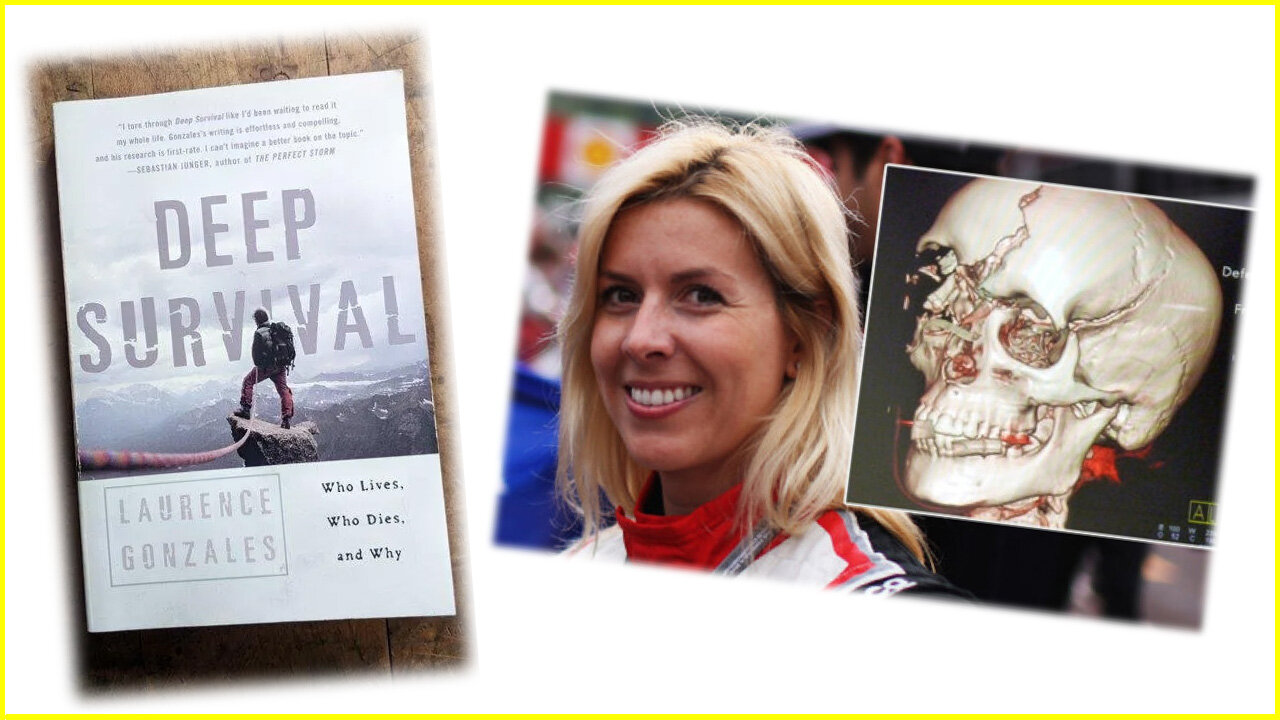Premium Only Content

'Deep Survival: Who Lives, Who Dies, and Why' (1994) by Laurence Gonzales
Laurence Gonzales’s 'Deep Survival: Who Lives, Who Dies, and Why', is a compelling blend of adventure narrative, psychological inquiry, and philosophical reflection. First published in 2004, it examines what separates those who survive life-threatening situations from those who perish, not only in wilderness disasters but also in crises of everyday life. Drawing from fields as varied as neuroscience, behavioral psychology, and aviation accident analysis, Gonzales builds a gripping argument that survival is not just about strength or skill—it’s about mindset, awareness, and adaptability under stress.
At its core, 'Deep Survival' explores the paradox that those who survive are often not the strongest, most experienced, or best prepared. Instead, they are the most emotionally resilient—the ones who can balance rational thought with instinctive reaction. Gonzales examines real-life survival stories—from mountaineers lost in blizzards to pilots forced to land crippled aircraft—and uses them as case studies to uncover the deep mechanics of human behavior in chaos. He blends these narratives with scientific explanations of how the brain responds to fear, confusion, and loss of control, especially the struggle between the rational neocortex and the primal emotional brain.
One of Gonzales’s key insights is that survival begins long before crisis. Those who live tend to cultivate habits of attention and curiosity—they notice details, stay aware of changing conditions, and constantly revise their mental models of reality. This aligns with the Buddhist-like mindfulness that Gonzales often emphasizes: awareness without panic. Survivors, he argues, accept their situation fully and act within it, rather than denying or resisting it. In contrast, those who perish often cling to expectations (“this shouldn’t be happening”) or freeze under cognitive overload.
Gonzales’s writing style is both lyrical and analytical. He writes with the flair of a storyteller—rich in imagery and suspense—but grounds his reflections in rigorous psychological research. His father’s survival of a WWII plane crash becomes a recurring motif, lending the book a personal resonance that transcends technical analysis. The tone oscillates between scientific detachment and emotional depth, mirroring the very tension he describes between intellect and instinct in moments of crisis.
The book’s greatest strength lies in its universality. While its examples often involve mountaineering, sailing, or wilderness adventure, Gonzales extends the metaphor to modern life: financial risk-taking, relationships, even the mental “survival” needed in a collapsing world. His argument—that the principles of survival are the same whether you are lost in a jungle or facing emotional catastrophe—gives the book a broader philosophical dimension. It becomes a manual not just for staying alive, but for living wisely.
Critics might argue that 'Deep Survival' sometimes leans too heavily on anecdote or that its mixture of science and spirituality can feel impressionistic rather than empirical. The neuroscience, though lucidly presented, occasionally oversimplifies complex brain functions for narrative clarity. Yet these are minor flaws in a work whose true ambition is not to produce laboratory data but to reveal the human condition under pressure.
Ultimately, 'Deep Survival' is as much about how to live as about how to survive. Gonzales suggests that survival is an act of humility—of aligning oneself with reality, letting go of illusions, and responding with clarity and grace. “Perceive, believe, and act,” he writes, capturing the essence of adaptive intelligence. The book’s deeper message is that survival is not a technical skill but a psychological art, a dance between fear and focus, despair and determination.
In conclusion, 'Deep Survival' stands out as one of the most insightful explorations of human endurance ever written. Laurence Gonzales bridges science, story, and philosophy to illuminate the fragile, astonishing resilience of the human mind. His work resonates not only with adventurers and rescuers but with anyone who has faced loss, crisis, or uncertainty—and found, within that moment of danger, a way forward.
Verdict: A profound and enduring meditation on the psychology of survival—equal parts adventure literature, neuroscience, and spiritual manual for life under pressure.
-
 2:18:46
2:18:46
Tucker Carlson
1 hour agoTucker Carlson Interviews Nick Fuentes
73236 -
 LIVE
LIVE
Barry Cunningham
3 hours agoPRESIDENT TRUMP MEETS WITH THE PRIME MINISTER OF JAPAN!! AND MORE NEWS!
1,749 watching -
 LIVE
LIVE
SpartakusLIVE
3 hours agoWZ Tonight || Battlefield 6 BATTLE ROYALE Tomorrow!
186 watching -
 1:24:56
1:24:56
Glenn Greenwald
2 hours agoThe Unhinged Reactions to Zohran's Rise; Dems Struggle to Find a Personality; DHS, on Laura Loomer's Orders, Arrests UK Journalist and Israel Critic | SYSTEM UPDATE #538
79.9K21 -
 LIVE
LIVE
Spartan
2 hours agoBack from worlds. Need a short break from Halo, so single player games for now
15 watching -
 LIVE
LIVE
Eternal_Spartan
9 hours ago🟢 Eternal Spartan Plays FF7 Rebirth Episode 15 | USMC Veteran
44 watching -

Tundra Tactical
1 hour agoProfessional Gun Nerd Plays Battlefield 6
167 -
 1:00:08
1:00:08
BonginoReport
4 hours agoDark Brandon Returns - Nightly Scroll w/ Hayley Caronia (Ep.164)
95.3K42 -
 49:24
49:24
Donald Trump Jr.
5 hours agoPeter Navarro Went to Prison So You Won't Have to | TRIGGERED Ep,286
44.2K37 -
 DVR
DVR
Nerdrotic
13 hours ago $1.00 earnedNerdrotic at Night 528
13K1